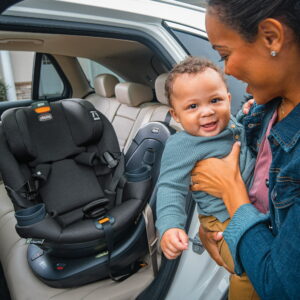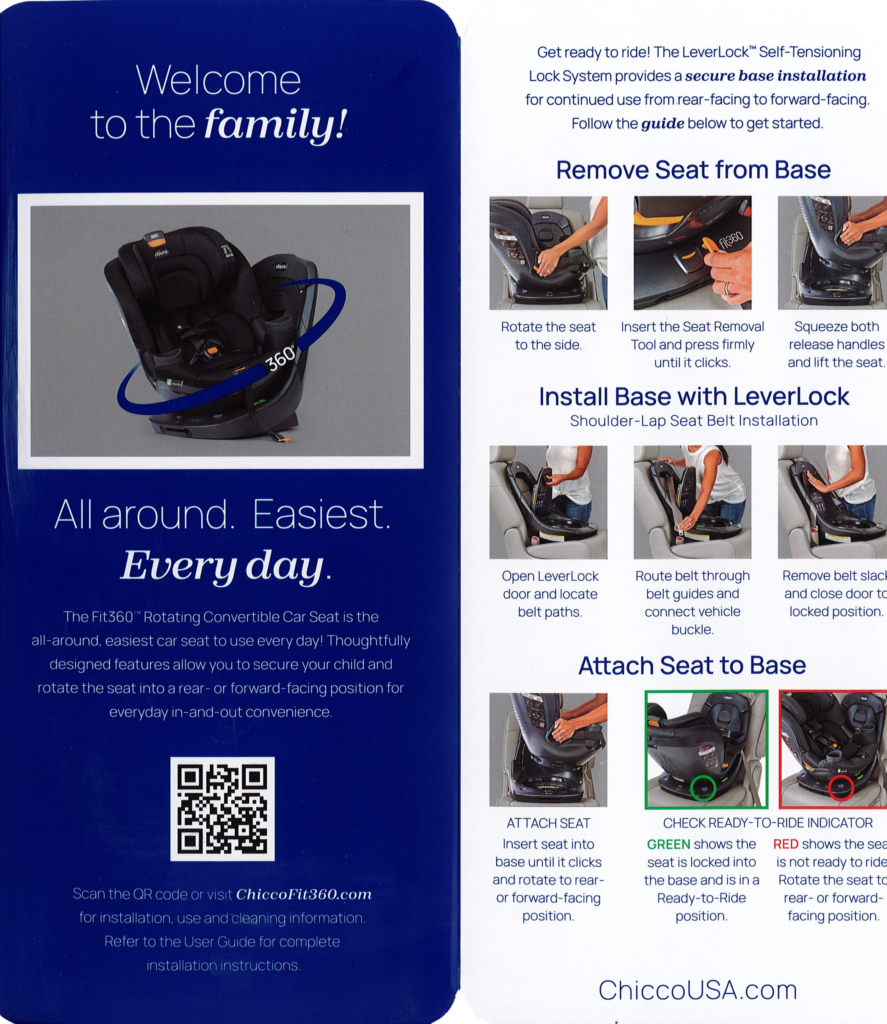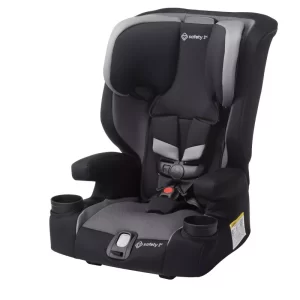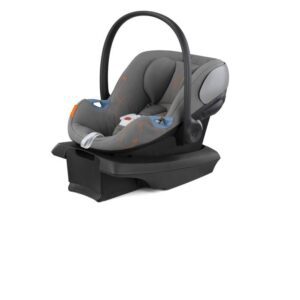Chicco Fit360 ClearTex Rotating Car Seat Review – Exceptional All Around

![]()
![]()
![]()
![]()
![]()
 The Chicco Fit360 ClearTex Rotating Convertible is the newest masterpiece from the talented car seat team at Chicco (pronounced Kee-Ko) and overall, it’s exceptional. As its name implies, Fit360 rotates a full 360° so you can take advantage of the swivel feature regardless of whether your child rides rear-facing or forward-facing. Equally important, the unique base design allows for a very simple and very secure installation. At the end of the day, it doesn’t matter how well a car seat rotates if you can’t achieve a secure installation. The Chicco Fit360 is one of the easiest car seats on the market to install correctly and that’s worth celebrating!
The Chicco Fit360 ClearTex Rotating Convertible is the newest masterpiece from the talented car seat team at Chicco (pronounced Kee-Ko) and overall, it’s exceptional. As its name implies, Fit360 rotates a full 360° so you can take advantage of the swivel feature regardless of whether your child rides rear-facing or forward-facing. Equally important, the unique base design allows for a very simple and very secure installation. At the end of the day, it doesn’t matter how well a car seat rotates if you can’t achieve a secure installation. The Chicco Fit360 is one of the easiest car seats on the market to install correctly and that’s worth celebrating!
Chicco Fit360 Specs & Features
Rear-facing: 4-40 lbs., 43″ or less
Forward-facing: 25-65 lbs., 49″ or less, at least 1 year old
360° rotation – seat swivels in both rear-facing and forward-facing orientations
15-position, no-rethread harness with unique magnetic chest clip
2-position buckle
Seat and base separate for ease of installation
6-position, anti-rebound base design
Belt-tensioning “LeverLock Door” on base is a true lockoff
Bubble level recline angle indicator
Red to green indicators visually confirm when the seat is rotated into one of two locked positions approved for travel
ClearTex fabrics are free of chemical flame-retardants and are also machine washable
Ventilated shell design allows air to circulate
Dual cup holders are removable and dishwasher safe
QR code that links to Fit360 instructions & videos
8-year lifespan before expiration
FAA-approved for use on aircraft (route the lap belt over the lockoff on the base)
Optional Fit360 rear-facing mirror accessory (sold separately $29.99) attaches securely to the top of the base
Extra Fit360 bases will be available for purchase later this Spring for $179 (woot!!!)
MSRP $399

Fit360 Fashions
Fit360 will be launching in 3 ClearTex fashions – Drift, Black & Slate. Not the most exciting colors but definitely the most popular. We hope to see some more colorful options in the future.

Fit360 Measurements
Maximum harness height: 18″
Lowest harness height with newborn insert: 7″
Lowest harness height without newborn insert: 9″
Exterior width at widest point: 18.25″
Interior width at shoulders: 12″
Seat pan depth: 13″
Fit360 Installation
Fit360 comes with a handy “Quick Start Guide”. There is also a QR code that is featured on the quick start guide as well as on a sticker on the side of the car seat. The QR code will take you to Fit360 instructions and videos on the Chicco website.

As you can see from the quick start guide, Fit360 must be removed from its base before you can install it. I’ll add my 2 cents based on experience since I fumbled around a little bit the first time I removed the seat from its base.
First, squeeze just one of the orange “seat release handles” and turn the seat so it’s facing sideways. Next, insert the plastic “Seat Removal Tool” located on the end of the adjuster strap into the similarly shaped opening on the Fit360 base until you hear a very distinctive sound. You need to press the tool *all the way* into the little opening. A release mechanism inside will activate with a prominent “click” when the tool is firmly pressed, and you can feel the release too.


Now squeeze BOTH seat release handles *firmly* and lift the seat up to remove it from its base. The first time I did this, I didn’t squeeze the release handles all the way and, not surprisingly, it didn’t detach. But I learned from my initial mistake and it’s been easy ever since.
Installation with seatbelt:
Installation with lap/shoulder seatbelt is the preferred installation method for Fit360. It’s so easy and you get an incredible, solid installation with almost no effort thanks to the innovative tensioning lockoff (LeverLock Door), combined with the unique beltpath design which takes full advantage of the shoulder belt portion of the seatbelt
Before you begin the base installation, prepare your tether strap by detaching it from its storage position and loosely attaching it to the tether anchor for that seating position. Snug up the tether strap as the last step of the base installation. I love that Chicco included a velcro fastener to keep any extra length of tether strap webbing neatly rolled up. Even better, it has an important message on it!


Next, find the correct recline angle. Look at the bubble level and if it’s NOT already in between the 2 lines, then adjust the base (there are 6 positions) until you get the bubble where it needs to be. Note: Make sure you’re parked on level ground! If you’re parked on a hill that’s going to skew the bubble level indicator.

If you need to adjust the angle, lift up on the orange adjustment handle and adjust the base to a different position by sliding it forward or backward until the bubble is between the 2 lines.

Now you’re ready to install the Fit360. If you’ve ever struggled to install a car seat securely, you’re going to be pleasantly surprised by how easy this is!
Open the “door”, thread the seatbelt behind the door and buckle it, then slip the shoulder belt into the slit on the top of the base. Make sure there is no excess slack in the seatbelt before closing the door until it clicks solidly into place. “LeverLock” is a tensioning lockoff so you should should feel some resistance as you press it closed.

Once the door is closed, check for tightness at the beltpath, making sure that the base doesn’t move more than 1″ from side-to-side or from front-to-back. Also check the recline indicator again to make sure the bubble is still within the 2 black lines.
If you know how to lock the seatbelt at the retractor, you can do that *after* the LeverLock lockoff is closed. It’s entirely optional and not necessary since LeverLock is a true lockoff, but if it makes you feel better to lock the seatbelt, there’s no harm in that.
 Once the LeverLock Door is shut and the base is properly secure, pull the tether strap until it’s snug. Tethering Fit360 is a requirement for all installation methods (seatbelt OR LATCH), but only if a tether anchor is available.
Once the LeverLock Door is shut and the base is properly secure, pull the tether strap until it’s snug. Tethering Fit360 is a requirement for all installation methods (seatbelt OR LATCH), but only if a tether anchor is available.
To clarify, there are really only a few situations where you might not have a tether anchor available and those include some vehicles made before 2002 and some 3rd row seating positions. Since it’s unlikely that you will be installing the Fit360 in a vehicle that is more than 22 years old, the only likely situations where you might not have access to a tether anchor would be in the 3rd row of some vehicles. Chicco has made it clear that if there is no tether anchor available, then tethering Fit360 is not required. I don’t know how many people want to use Fit360 in a really old vehicle, or put it in the 3rd row where a tether anchor might not be available, but it’s nice to have that option.
Installation with a lap-only seatbelt: I’m not going to go into a lot of detail here because very few people will ever need this information, but here it is in a nutshell. Avoid installing Fit360 with a lap-only seatbelt in a vehicle if you can help it (airplanes are a different story).
If you have no other option (no lap/shoulder seatbelt or LATCH system), then use Fit360 in the rear-facing position if the child is under 40 lbs. and less than 43″ tall. Read pages 72-77 in the Fit360 manual for important instructions on installing the base with just a lap belt.
Using Fit360 forward-facing when installed with just a lap belt also requires using different grippy harness pads that are stored under the cover (pages 100-101 in the manual).
Installation with LATCH:
Initial steps are the same as installing with lap/shoulder seatbelt. Make sure you’re parked on level ground, prep the tether strap and make sure the bubble level indicator is between the 2 lines. If it’s not between the 2 lines, adjust the base until it is.
As mentioned previously, lap/shoulder seatbelt is the preferred installation method for Fit360. However, if you have a compelling reason to want to install with LATCH, just know that it’s easy but there are rules. Fit360 is heavy which results in low LATCH weight limits.

LATCH Weight Limits:
Rear-facing: 30 lbs.
Forward-facing: 35 lbs.
For children who weigh more than the LATCH weight limit, install Fit360 with seatbelt and tether.
Center LATCH Installation with Non-Standard LATCH Spacing:
Chicco does NOT allow a LATCH installation in a center seating position where you would have “non-standard spacing” (more than 11″ apart) due to borrowing lower anchors. You may only install Fit360 with LATCH in the center position if your vehicle has dedicated lower anchors for the center seat.
Inflatable Seatbelts:
Chicco does NOT allow installation with the inflatable seatbelts found in some Ford and Lincoln vehicles. They go so far as to state in the manual that if installing with LATCH in a seating position that has inflatable seatbelts that “the unused seat belt should NOT be buckled behind the Child Restraint System as this will engage the inflatable portion of the belt”. Considering the low LATCH weight limits of Fit360, this seat would not be a good choice for vehicles with inflatable seatbelts.
Ready to Ride Indicators:
Red to green indicators visually confirm when the seat is rotated into one of two locked positions approved for travel, either rear-facing or forward-facing. Make sure the Fit360 is locked into either the RF or FF position before you drive off – even if the seat is unoccupied.
Fit-to-Vehicle
Compatibility:
We installed Fit360 is a variety of vehicles and had no compatibility issues in any of them. Heather was thrilled to discover that Fit360 fit beautifully in her Tesla Model X, almost as if it was made for that vehicle. This is no small feat considering the Model X is notorious for incompatibility issues with many different car seats and boosters. It was a lovely surprise.



It also installed very nicely in the Model 3 with no compatibility issues.



Since we know Tesla models are so popular (at least in some parts of the country), we will add pictures and comments of Fit360 in a Tesla Model S and Model Y as soon as we bribe our Tesla friends to give us the opportunity to try the Fit360 in their vehicles.
Rear-Facing Space:
When rear-facing, the Fit360 isn’t what I would consider compact but it’s also not a space hog. In my 2018 Subaru Outback and in my Ford Minivan, I can sit comfortably in the drivers seat with Fit360 installed behind me. However, I’m only 5’4″ so, your mileage will vary.
For reference, a rear-facing Fit360 takes up roughly the same amount of room as a rear-facing Chicco OneFit All-in-One. You can see these models side-by-side here in the minivan. It’s hard to tell from the camera angles but they are almost identical in the amount of front-to-back space that they take up.


Rear-facing contact with the front seat:
 Chicco ALLOWS all of their rear-facing only seats (KeyFit 30, KeyFit 35 & Fit2) and all of their convertible/all-in-one seats (Fit360, OneFit, NextFit, Fit4) to make light contact with the front seat after being properly installed. Light contact means that the back of the vehicle seat is not forcefully pressing into the back of the car seat or changing the angle of the installation.
Chicco ALLOWS all of their rear-facing only seats (KeyFit 30, KeyFit 35 & Fit2) and all of their convertible/all-in-one seats (Fit360, OneFit, NextFit, Fit4) to make light contact with the front seat after being properly installed. Light contact means that the back of the vehicle seat is not forcefully pressing into the back of the car seat or changing the angle of the installation.
Fit-to-Child
Inserts and strap covers: Fit360 comes with newborn inserts, a “Flex-Forward” buckle cover that helps to keep the buckle from getting lost under your child when loading, harness strap covers (“shoulder pads”) and extra strap covers (“waist belt pads”) that go over the hip straps.
The waist belt pads look very similar to the shoulder pads but their purpose is to keep the buckle tongues from sliding all the way down when you take your child out of the seat. If you feel like you spend half your life digging under your child to find the car seat buckle and buckle tongues, you’ll really appreciate these features.

With the exception of the newborn inserts (which are required for babies 4-11 lbs.), everything else is entirely optional.
The 2 newborn inserts (head and lower body) are designed to work together. Chicco calls these inserts the “Newborn Head and Body Positioner”. Both inserts are required for babies who weigh 4-11 lbs. (1.8 – 5 kg). If your baby weighs more than 12 lbs. when you start using Fit360, remove both of these inserts.
The newborn body positioner insert is more substantial than most infant inserts. It’s durable, molded EPP foam with a zip-off ClearTex cover for easy cleaning.


We tried various children (and a few dolls) in the seat and found an excellent fit all around.
Preemie Doll (wearing a cloth diaper made for actual tiny humans). Using newborn head & body positioners, as required. Harness strap covers and waist strap covers have been removed.


Baby I is 8 months, 20 lbs. & 31″ tall. She’s very close to outgrowing her infant car seat by height. She fit so nicely in Fit360 and looked very comfortable. The interior angle was really ideal.

A is 2.5 years old, 36″ and 32 lbs.


 T is 5 years old, 42 lbs. and 43″ tall. He is a couple of pounds over the RF weight limit now but we wanted to see how he would fit because he’s right at the 43″ height limit for RF. With the harness placed slightly below his shoulder level, he still had more than 1″ of shell above his head. And he had enough room for his long legs to be comfortable. He could have made it to age 5 rear-facing in this seat because he didn’t hit 40 lbs. until after his 5th birthday.
T is 5 years old, 42 lbs. and 43″ tall. He is a couple of pounds over the RF weight limit now but we wanted to see how he would fit because he’s right at the 43″ height limit for RF. With the harness placed slightly below his shoulder level, he still had more than 1″ of shell above his head. And he had enough room for his long legs to be comfortable. He could have made it to age 5 rear-facing in this seat because he didn’t hit 40 lbs. until after his 5th birthday.


Here he is forward-facing with room to grow before he maxes out the harness by height. Most kids will fit in a car seat with 18″ max harness height until around age 6, but some kids will fit even longer – it really depends on torso height. Obviously, every child is different but most will be ready for a booster by the time they outgrow a harnessed seat with an 18″ max harness height.

Ease of Use
Rotation: The rotation is smooth but it takes some force to get it moving. When the seat is locked in the rear-facing position, I can rotate it sideways and back to rear-facing again with one hand. It requires some effort but I can move it with one hand, which is what really matters because in real life you’re holding a baby or toddler with your other arm. Moms quickly learn to do everything with one hand. You gotta adapt to survive.
However, it’s worth noting that once the seat is locked in the forward-facing position, I cannot rotate it to the side with one hand. That doesn’t mean that you won’t be able to turn it, but I cannot. It’s a combination of several factors for me, but ultimately I need my other hand to assist in the process.
This is less problematic at this point because by the time your child is forward-facing, you probably won’t be carrying them to the car. Or if you do carry them, you can certainly put them down for a second while you use two hands to rotate Fit360 to the side. It’s also possible that your child will be able to climb into the car seat on their own at that point and you may not even use the rotation feature.
Loading & Unloading: Obviously, the rotation features helps tremendously with this process but Fit360 has additional features that really minimize the usual hassles associated with loading and unloading. The “Flex-Forward” buckle cover moves the buckle forward so it doesn’t get lost under your child. The buckle pockets can be used to store the buckle tongues and the hip strap covers keep them from sliding all the way down. Together, these features really make a difference.
Harness adjustment: The harness adjustment is “smooth like buttah”, no matter which position the headrest is in, which is fabulous. Since tightening and loosening the harness is something that most parents do every single time they load and unload their child – this is a beautiful thing. Having harness straps that are easy to tighten also makes it more likely that parents and caregivers will snug up the harness appropriately.
With that said, the orange button that you press to release the harness (so you can loosen it) takes some force to push. I need to use my thumb because my index finger doesn’t have the strength to press it hard enough to release the adjuster.
Magnetic chest clip: I wasn’t sure how I was going to feel about the magnetic chest clip but I really like this design! It’s easy for a parent to open and close and yet difficult enough to keep a younger child from opening it.
Our 5-year-old Fit360 tester was able to open it eventually after some practice (and after assurances from his mom that it was okay), but he can also open most typical (non-magnetic) chest clips. If you have an older child who enjoys the independence of unbuckling themselves (when it’s safe to do so), it’s possible that your child may learn to open this magnetic chest clip with some practice. However, I don’t think it’s something that the average toddler or preschooler will have the dexterity to accomplish if they are harnessed snugly.
Headrest height adjustment: Fit360 has a no-rethread harness with 15 height positions. Moving the headrest up and down is not as smooth and easy as it is with some other Chicco seats. There is definitely friction. But this isn’t something that you’re going to be adjusting every day, so as far as I’m concerned – it’s not a big deal.
Tip: You can squeeze the orange actuator on the top of the headrest from the front or the back. It’s actually easier to squeeze it from the back, especially if you want to adjust the harness height when the seat is rear-facing.
Cover removal and replacement: The Chicco website has great videos on removing and replacing the cover. Watch them and you won’t struggle with taking the cover off like Heather did. 😜 (hint: the “vegan leather” parts come off last)

Cleaning instructions: Hand wash cover using mild soap and water, or machine wash in cold water on delicate cycle using mild detergent. Hang to dry. Sponge harness webbing clean using warm water and mild soap. Air dry.
Do NOT machine wash the harness straps. Cup holders are dishwasher safe – top rack only.
ClearTex Fabrics

Chicco has made a big commitment to innovative new textiles that don’t require chemical treatments to pass the flammability standard. ClearTex products use fabrics, foams and labels that comply with federal standards without adding flame-retardant chemicals. ClearTex utilizes an innovative construction of polyester fibers to produce fabrics that are inherently fire-resistant. All ClearTex fabrics are UL GREENGUARD GOLD certified. GREENGUARD is a third-party governing body that tests and certifies materials.
Extra Bases & Accessories
The option to purchase extra Fit360 bases is HUGE! Many parents buy extra bases for their infant seat, and it’s logical they they will appreciate the same convenience for bigger seats too. MSRP for Fit360 bases is $179 and they will be available at some point this Spring.

An optional Fit360 rear-facing mirror accessory (sold separately for $29.99) attaches securely to the top of the base. This accessory was designed by Chicco specifically for use with the Fit360 base and it’s very secure.

A wheeled travel bag (MSRP $99) is also available and it fits all Chicco car seats as well as many car seats from other brands.

Fit360 Advantages
360° rotation – seat swivels when rear-facing or forward-facing
Ergonomically designed to support children in a natural seated position
15-position, no-rethread harness with unique magnetic chest clip
Harness straps don’t twist
Seat and base separate for ease of installation
6-position, anti-rebound base design
Belt-tensioning “LeverLock Door” on base is a true lockoff
Smooth bottom base won’t damage vehicle upholstery
ClearTex fabrics are free of chemical flame-retardants and are also machine-washable
QR code links to Fit360 instructions & videos
Instruction manual is clear and well-written
FAA-approved for use on aircraft (route the lap belt over the lockoff on the base)
Optional Fit360 rear-facing mirror accessory
Extra Fit360 bases available
Disadvantages:
(In all fairness these aren’t really problems but I list them here to inform you of some potential Fit360 issues)
Heavy – the combined weight of the seat and base is 33 lbs.
Low LATCH weight limits due to the weight of the product
Harness adjuster button requires some force to loosen harness straps
You may need 2 hands to rotate Fit360 when it’s locked in the forward-facing position
Conclusion:
Rotating car seats are the hot new trend but there are benefits to being late to the party. It’s obvious that Chicco took full advantage of the extra study time when designing the Fit360. Unlike some other manufacturers, they didn’t rush their rotating car seat to the market and it shows. The Fit360 is very “Chicco-esque”. If you’ve ever owned a Chicco car seat, you’ll know what I mean. They are just designed to be easy to use. Chicco’s attention to details, both big and small, is impressive and appreciated. Since everything sounds better in Italian, I’ll conclude by saying, Chicco Fit360 è eccezionale!







